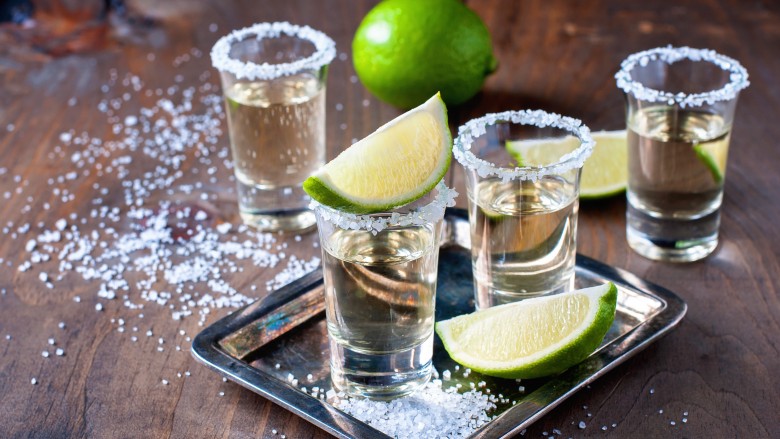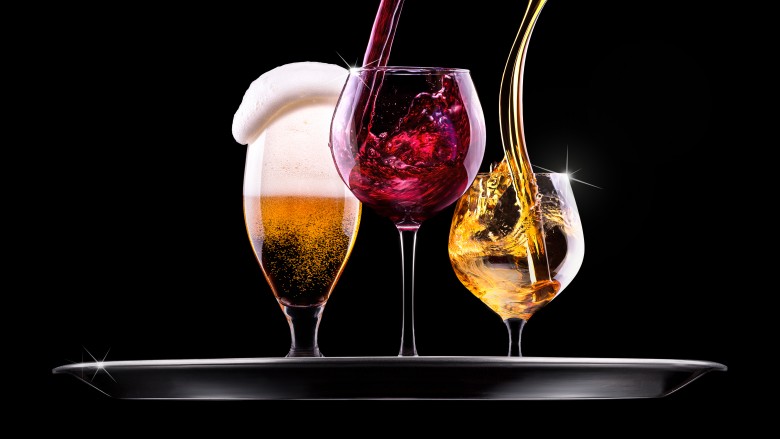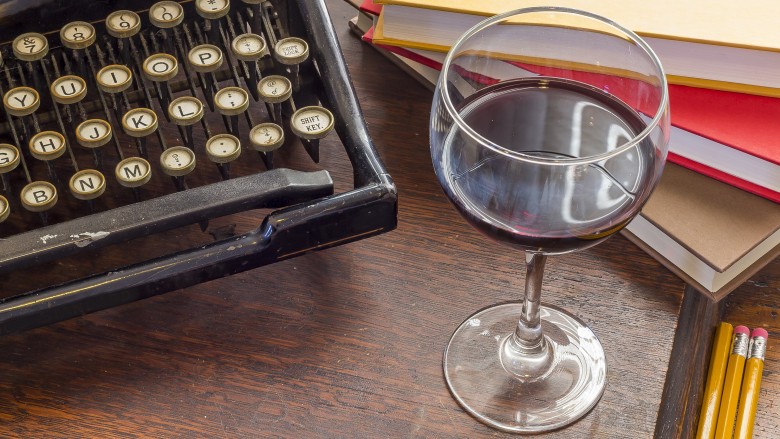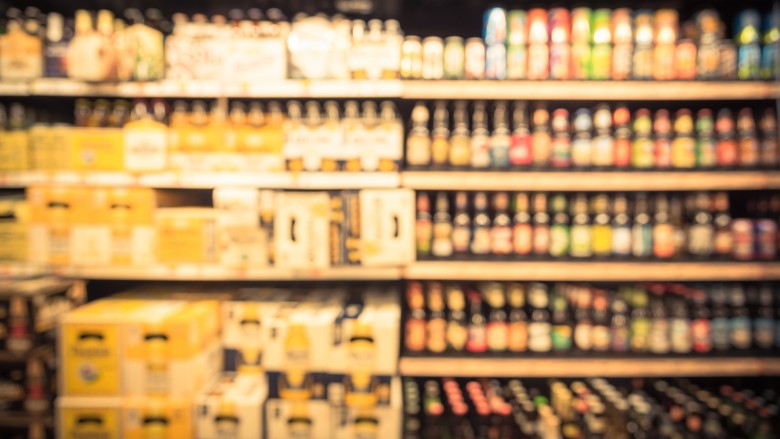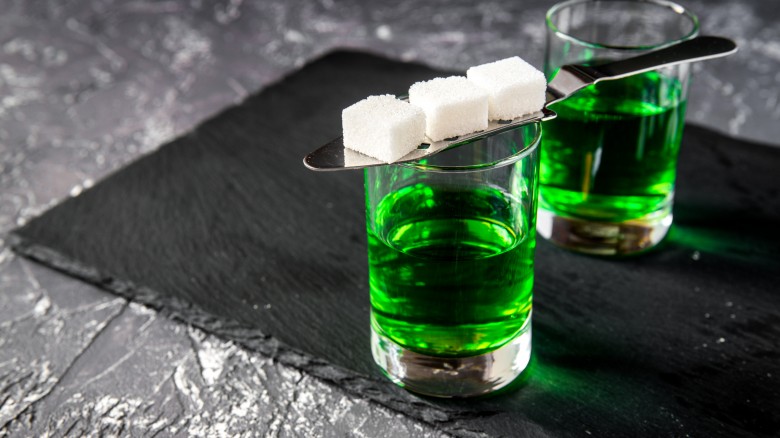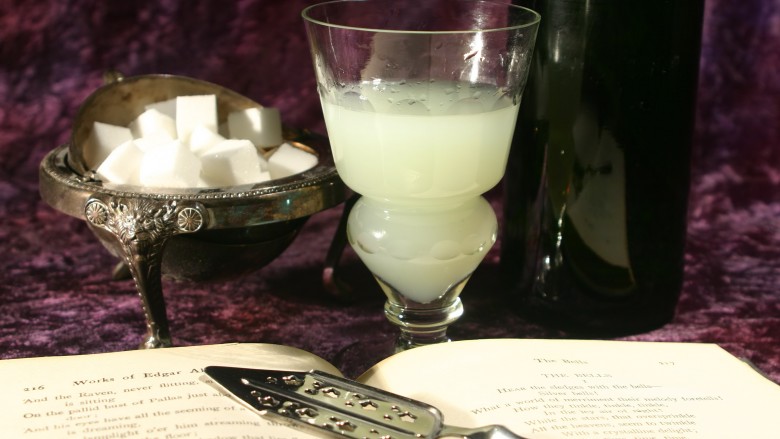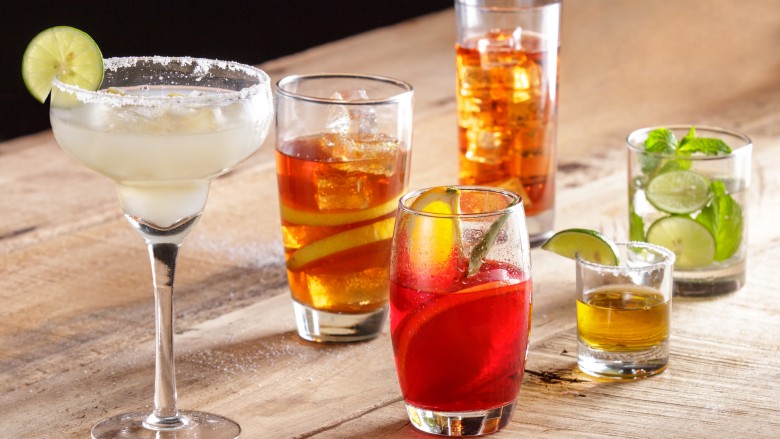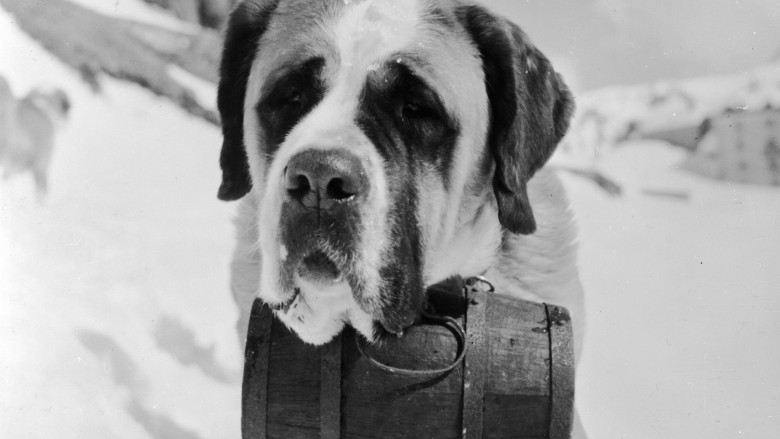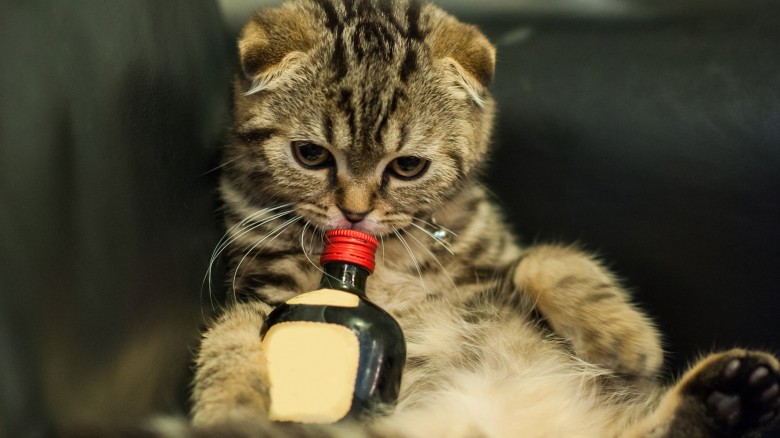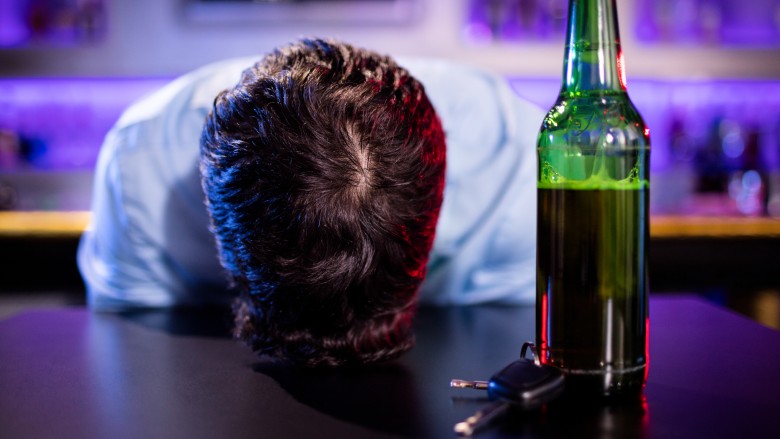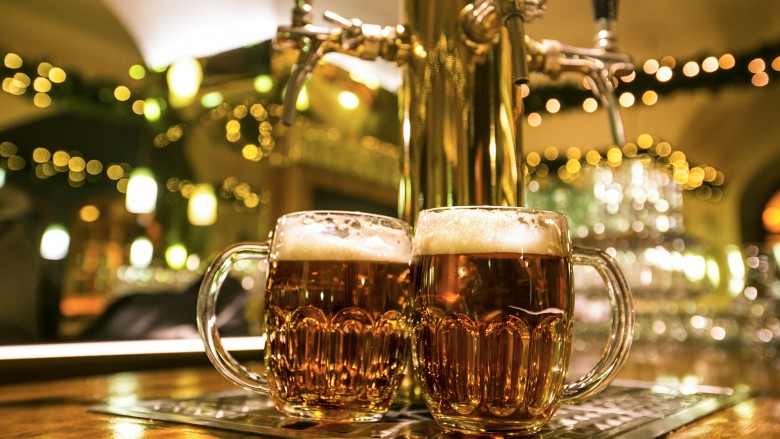False Facts About Booze That Everyone Believes
Alcohol is pretty awesome (while consumed safely and in moderation — no one likes an obnoxious drunk). Hell, some days the only reason we get out of bed is because Happy Hour exists, so there's a lot we won't judge. We will, however, judge you for repeating a bunch of boozy misconceptions and myths, so let's clear the air so we can get on with the drinking:
Tequila comes with a worm in the bottle
To many, it's not tequila until you stick a big 'ol worm in the bottle. No one knows why, both because it makes no sense at all, and because, well, it doesn't happen.
The worm can actually be found in mezcal, the upstart cousin of tequila — the only difference (apart from the worm) is how much Blue Agave is in the liquor. Tequila has to be at least 51 percent Blue Agave to be called tequila, but mezcal can be made of pretty much any old stuff. It didn't take Don Draper to realize such a difference doesn't scream "brilliant marketing," so they started throwing a worm in as a gimmicky marketing tool. They wanted some way to set mezcal apart from tequila, but the fact that you now think tequila is the one with the worm illustrates just how bad an idea this was. Apparently, people found that the most important thing to remember wasn't the product, but how they were now drinking worm-flavored juice.
There's another theory that says the larvae was included because it was supposed to change the taste of the mezcal, and honestly, we don't want to think about that. Sure, bugs have been used to color food for ages, but we totally draw the line at larvae marinating in our liquor. We drink to forget our problems, not get distracted by other ones.
Mixing types of alcohol makes everything so much worse
You know the rhyme: Liquor before beer, never fear, but beer before liquor, never sicker. Here's another one: the rhyme is a lie, a stupid rule to go by.
That's because science says there's no combination of beer, liquor, and wine that's going to make your hangover a million times worse than usual. When it comes to what order you consume your drinks in, it likely has something to do with how you drink instead of what you're drinking, because there's two major components to causing a hangover: how much you drink, and how fast you drink it. Take beer and liquor. While you might be perfectly capable of knocking back a few shots of birthday-cake flavored vodka (we did say we wouldn't judge), you're probably not going to be doing the same to your pint of beer, unless you have problems way beyond what we want to talk to you about. That means the alcohol from the shots will hit your system faster, get you drunk faster, and you'll be going to go to bed feeling worse if you drink a ton of those.
You also need to factor in something called congeners: a byproduct of fermentation that's present in higher quantities in drinks like bourbon. That's been found to make hangovers worse too, so at the end of the day, getting — or dodging — a hangover is much more complicated than just what you drink. The best way to not feel like death warmed over the next morning? Have that pale ale and that shot of vodka ... but in moderation. It's not just for your liver anymore.
Alcohol only impairs brain function
We've heard all the stories that started with a few drinks and ended in the hospital, but getting at least slightly tipsy might not be as brain-damaging as you think. (Before the good news, a disclaimer. All that stuff about alcohol slowing reaction time is completely proven. So, remember that bit of information, too.)
Now, onto the good news. In 2012, researchers took a look at whether or not there was anything to the stories about alcohol and the creative artist, and found that there totally is. When they gave subjects some alcohol and food, those subjects performed better when faced with a series of word problems designed to test a person's creativity, than people who were just given the problems. We could have told you that, but scientific proof makes us happy ... and less guilty about pouring ourselves a drink every time we sit down to write our Great Novel.
Other studies have shown that alcohol also impacts the release of dopamine in the brain, which is where things get tricky. Since it's also a depressant, that means a few drinks will make you feel awesome, but that depression side is going to kick in with a vengeance, too. That explains the mood swings that some people get at a certain point in the night, and the positive effects also slow if you drink more, too. So, it's not all good news. Most interesting, though, is a study from University College London, which found drinking a moderate amount of alcohol every day improves overall brain function, especially in women. It's thought that alcohol's ability to open blood vessels and increase blood flow has something to do with the findings, which looked at 10,000 people who participated in a study that started in 1967. People who drank moderately scored higher on tests that measured everything from verbal skills to memory, and the lowest scores came from those who abstained from alcohol completely. Take that, Temperance League!
Bottled beer is better than canned
Every pub or party has their own local beer ponce — the one that just couldn't bear to be seen drinking anything out of a can. Bottles are the way to go, they'll say, probably after sniffing pretentiously at their beer — one that's named something like Frosty Leper's Eloquent Ale. Want to tell them they're wrong? You can, and all you need to do is point out that canned beer is better than beer out of a bottle.
That's not just an opinion, either. Just ask Ska Brewery in Colorado, a craft beer company who's gone cans all the way. According to them, it's not just easier to carry, cheaper for them, and more environmentally-friendly — it's better for the beer. Pouring a skunky beer will ruin your night really quickly, and the biggest contributors to skunked beer are light, heat, and oxygen. Amber bottles might block most of the light (with clear and green bottles not even in the running), but cans block all the light. They're also perfectly sealed, so there's not going to be any oxidation going on. Cans are lighter, and that means they're not just more convenient, but their lighter weight is going to help make them more environmentally friendly — plus, since they're widely recycled, lower transportation costs are a big deal.
More and more breweries — big and small — are making the switch to cans, because at the end of the day, bottles don't have that much going for them. So, don't feel bad about picking up cans, and feel free to revel in both the science and the agonized sobbing of your local beer snob.
Absinthe is a hallucinogenic, extra-alcoholic, or extra-dangerous
The romance (and reputation) of absinthe is undeniable — you've probably heard that it causes hallucinations, that it's super-dangerous, super-alcoholic, or similar such stories. Thing is, it's all nonsense.
In the early 20th century, Europe and America banned together in outrage, because every generation needs its thing to outrage against. Absinthe was demonized as the source of all sorts of things, and the so-called Green Fairy was condemned by polite and responsible society. But when olde-timey absinthe was analyzed by the much more modern Chemical & Veterinary Investigation Laboratory in Germany, they found that there was definitively nothing in absinthe that would cause effects like the ones usually attributed to it.
The culprit is usually pegged to be thujone, a chemical that's present in modern absinthe, too. It was believed that there was too little thujone in modern samples to cause the same kind of madness that had originally given absinthe its reputation, but there's no real difference between modern stuff and the green fire that Van Gogh was drinking when he cut off his ear. They did note that people probably weren't making up their hallucinations just to be cool, but that it was probably sheer volume that brought on the ill effects. So go ahead, drink up. It's not going to make you see pink elephants, but drink too much and you might pass out ... you know, like what happens when you drink too much Goldschlager.
Absinthe was illegal for a long time
Ah, absinthe. The illicit atmosphere, the ceremony, the undeniable Victorian air. And the illegality, right? We'll pause while you fan yourself and swoon accordingly, before insisting that there's no way this one's wrong.
It is, technically, and the truth is, no one really knows just how and when absinthe became legal in the US again. It's possible that it was as far back as the 1930s, and it's all down to the chemical that's blamed for most of the supposed hallucinogenic properties: thujone. US law states that, in order to be sold, absinthe had to be thujone-free. That's a bit of a misnomer, though, as the fine print specified that there could actually be at least 10 parts per million. In 2008, the EU raised their legal limits of thujone to 35ppm, and that's usually when most people think absinthe became legal again. The US approved the change, absinthe could be imported, and all was good in the world of writers and artists all over the place.
But, there's a catch. When 19th-century samples of absinthe were analyzed, they contained between zero and 48ppm of thujone. That means that many of those brands were actually always legal, even under the ban, and we could have been drinking this wonderful, weird green drink the whole time. We have a lot of gulping to make up for.
Different types of liquor cause different behavior patterns
You know the person that swears off a certain kind of liquor because they say it makes them mean, sad, or more hungover in the morning? Science says that person is fill of it.
We'll start by explaining there's actually been a couple of studies done on this, because of course there's been. In 1984, rats were injected with different kinds of liquor and monitored for the development of drunken behavior — while the type of liquor didn't change how they acted, there's no word on whether or not it changed how they felt, you know, emotionally speaking. Another study looked at the difference in how vodka and bourbon impacted volunteers' moods, and there was no real, observable, obvious difference.
There's a couple of different explanations for why you might experience different emotions or states of drunkenness, and none involve the actual type of alcohol. One theory says that if you look at your drink of choice, you know exactly what it's going to take to get you feeling good, tipsy, then hammered. Switch things up a bit, and your normal routine is gone. You might even be drinking different concentrations of liquor, and that's not going to make life easy. Another theory says that it might be the mixers you're using, and that the Red Bull you're starting to mix with your vodka is going to act differently than the tonic you usually have with your gin. Also, it might have something to do with the power of belief, too. If you think you're going to be a jerk when you start drinking tequila, then you might be drinking that tequila for an excuse to be a jerk. Don't do that. Don't be a jerk.
Alcohol makes you warmer
We love dogs, and we love alcohol, so of course dogs that bring us alcohol! We'd totally get stranded in a snowstorm just so we could be found by a big Saint Bernard with a little flask around his neck, and no amount of debunking is going to make us change our mind.
Unfortunately, here comes the debunking — alcohol only makes you feel warmer, while it's really making you colder. That bit of weirdness happens because, when you drink, the alcohol opens up the blood vessels at the surface of your skin. The increased blood flow causes you to not just feel warmer, but it's why some people's faces turn red after they've had a few. That increased blood flow has to come from somewhere, and it's being pushed out of your body's core. That means your core temperature drops while your skin feels warmer, and since alcohol also inhibits other warming behaviors — like shivering — that brandy-bearing pup isn't doing you any favors, no matter how good his intentions might be.
A bit of the hair of the dog will cure your hangover
Drinking some more on the morning after to help kick a hangover is questionable wisdom that's been around since the 16th century, when it was believed that putting some literal hair, from the dog who bit you, into the open wound would prevent rabies. That's crazy, and drinking more to get rid of a hangover is just as crazy.
That's because of how hangovers work. Symptoms appear when blood-alcohol content reaches zero again, so knocking back another Long Island Iced Tea with breakfast is just going to keep your BAC above zero. Sure, that's going to postpone symptoms a bit, but they're still going to show up. (Unless you just keep drinking, and we absolutely don't recommend that.) There's other factors, too, and hangovers actually include things like an outraged immune system that's rushing to do damage control. Add in alcohol's diuretic effects and irritating effects on your stomach and no, adding more insult to injury isn't going to help. In fact, nothing will — maybe someday, you'll learn your lesson.
Alcohol will help you sleep
This one is so widespread there's a name for it: a nightcap. Popular belief says a drink will help you sleep, but while it's likely to help you fall asleep faster, the problems will start about mid-way through the night. Once the alcohol is metabolized and the effects start to wear off, you're going to find yourself getting less REM sleep than you need to wake feeling bright-eyed and bushy-tailed. We've known about this for a long time too — as early as 1939, studies found that by monitoring the body temperature of someone who had a drink before bed, we can tell when the alcohol's worn off by the rising body temperature and increasing discomfort.
There's other bad news, too. Alcohol has been found to make nightmares worse and dreams more disruptive, so if you're the type that likes waking up in the middle of the night after dreaming of carnivals, clowns, and cannibals, by all means, drink up. If you're prone to things like sleepwalking, you're more likely to do that after having a drink before bed, and you're more likely to act out your dreams, too. No one wants to act out their cannibal dreams.
Wine is the only alcohol with any health benefits
Every so often, news about the benefits of a nightly glass of red wine makes the rounds on social media, and everyone shares it like they've never heard it before. That makes people who don't care for red wine feel a bit left out, and we're about to make beer drinkers feel very smug indeed.
In 2016, Pennsylvania State University released their findings, based on a survey of 80,000 adults. They found that a daily pint (or two) helped improve cholesterol, and also reduced the risk of heart disease and stroke. That was added to a massive list of beer benefits, including findings that indicate moderate beer consumption was linked to a decreased risk of kidney stones, of atherosclerosis (clogged arteries), Alzheimer's, cataracts, and diabetes, and it raised some good things, too. Moderate beer drinking increased production of silicon, which leads to stronger bones, and it also introduced a chemical called xanthohumol to the diet. That's been shown to lower chances of something called metabolic syndrome, which includes all sorts of nasty things like high blood pressure. It's also been suggested that beer contains chemicals that help the body halt the growth of disease, and that might just be the breakthrough that's needed in cancer research.
So, there you have it. Drink beer — in moderation — for good health. Just try not to remember that alcohol also causes cancer. You can decide if it's worth it or not!
